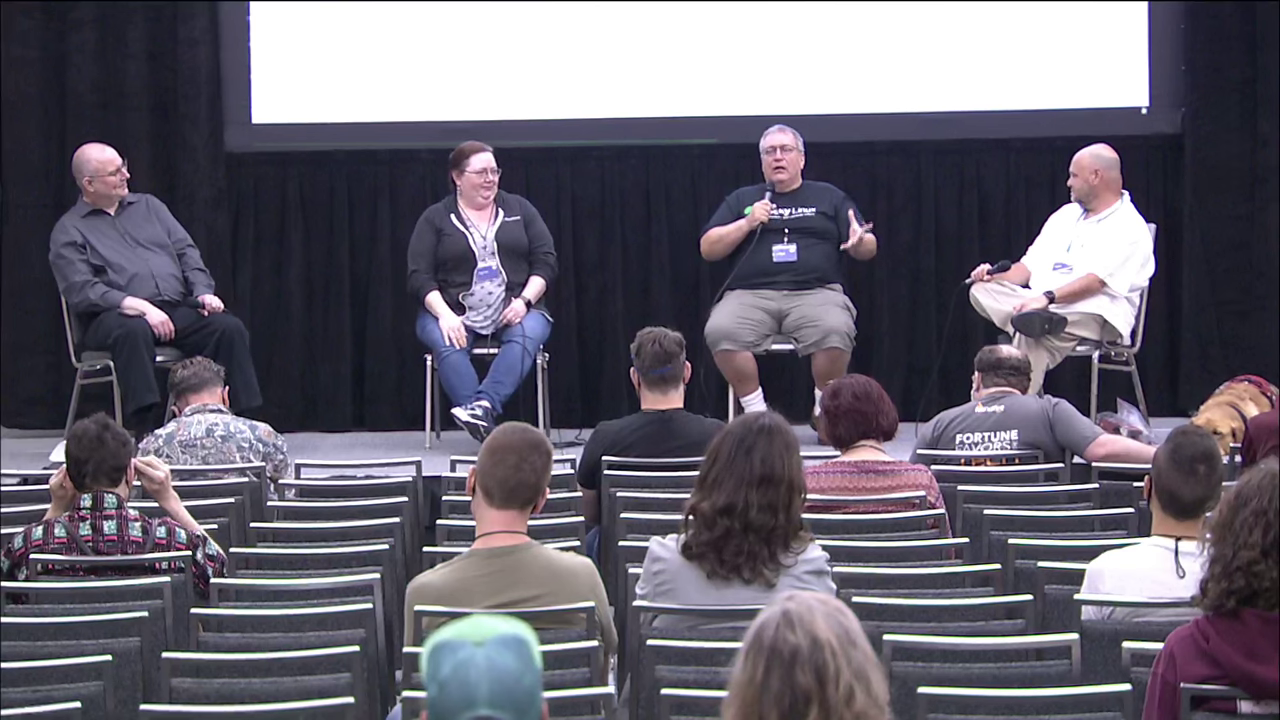Slashdot Summary:
Last weekend in Portland, Oregon, the Software Freedom Conservancy hosted a new conference called the Free and Open Source Software Yearly.
And long-time free software activist Bradley M. Kuhn (currently a policy fellow/hacker-in-residence for the Software Freedom Conservancy) hosted a lively panel discussion on “the recent change” to public source code releases for Red Hat Enterprise Linux which shed light on what may happen next. The panel also included:
- benny Vasquez, the Chair of the AlmaLinux OS Foundation
- Jeremy Alison, Samba co-founder and software engineer at CIQ (focused on Rocky Linux). Allison is also Jeremy Allison - Sam Slashdot reader #8,157.
- James (Jim) Wright, Oracle’s chief architect for Open Source policy/strategy/compliance/alliances
“Red Hat themselves did not reply to our repeated requests to join us on this panel… SUSE was also invited but let us know they were unable to send someone on short notice to Portland for the panel.”
One interesting audience question for the panel came from Karsten Wade, a one-time Red Hat senior community architect who left Red Hat in April after 21 years, but said he was “responsible for bringing the CentOS team onboard to Red Hat.” Wade argued that CentOS “was always doing a clean rebuild from source RPMS of their own…” So “isn’t all of this thunder doing Red Hat’s job for them, of trying to get everyone to say, ‘This thing is not the equivalent to RHEL.’”
In response Jeremy Alison made a good point. “None of us here are the arbiters of whether it’s good enough of a rebuild of Red Hat Linux. The customers are the arbiters.” But this led to an audience member asking a very forward-looking question: what are the chances the community could adopt a new (and open) enterprise Linux standard that distributions could follow. AlmaLinux’s Vasquez replied, “Chances are real high… I think everyone sees that as the obvious answer. I think that’s the obvious next step. I’ll leave it at that.” And Oracle’s Wright added “to the extent that the market asks us to standardize? We’re all responsive.”
When asked if they’d consider adding features not found in RHEL (“such as high-security gates through reproducible builds”) AlmaLinux’s Vasquez said “100% – yeah. One of the things that we’re kind of excited about is the opportunities that this opens for us. We had decided we were just going to focus on this north star of 1:1 Red Hat no matter what – and with that limitation being removed, we have all kinds of options.” And CIQ’s Alison said “We’re working on FIPS certification for an earlier version of Rocky, that Red Hat, I don’t believe, FIPS certified. And we’re planning to release that.”
AlmaLinux’s Vasquez emphasized later that “We’re just going to build Enterprise Linux. Red Hat has done a great job of establishing a fantastic target for all of us, but they don’t own the rights to enterprise Linux. We can make this happen, without forcing an uncomfortable conversation with Red Hat. We can get around this.”
And Alison later applied a “Star Wars” quote to Red Hat’s predicament. “The more things you try and grab, the more things slip through your fingers.” The more somebody tries to exert control over a codebase, the more the pushback will occur from people who collaborate in that codebase." AlmaLinux’s Vasquez also said they’re already “in conversations” with independent software vendors about the “flow of support” into non-Red Hat distributions – though that’s always been the case. “Finding ways to reduce the barrier for those independent software vendors to add official support for us is, like, maybe more cumbersome now, but it’s the same problem that we’ve had…”
Early in the discussion Oracle’s Jim Wright pointed out that even Red Hat’s own web site defines open source code as “designed to be publicly accessible — anyone can see, modify, and distribute the code as they see fit.” (“Until now,” Wright added pointedly…) There was some mild teasing of Oracle during the 50-minute discussion – someone asked at one point if they’d re-license their proprietary implementation of ZFS under the GPL. But at the end of the panel, Oracle’s Jim Wright still reminded the audience that “If you want to work on open source Linux, we are hiring.”
Oracle keeps trying to throw shade, but I hope everyone knows that it’s just opportunistically poking a competitor in the eye. They don’t have an open source leg to stand on.
Relicense or update CDDL to be GPL compatible and then I’ll reevaluate.



